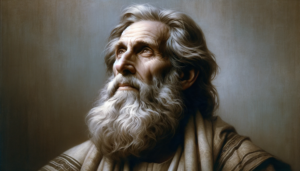Sumario
ToggleIntroduction:
The story of Abraham’s sacrifice of Isaac, as described in the book of Genesis, chapter 22, is one of the most enigmatic and debated passages in the Bible.
This episode is not just a milestone in biblical narratives but also a focal point for theological, philosophical, and ethical reflections that transcend time. This article explores the various layers of this story, examining its moral implications, ethical dilemmas, and the enduring impact on various thought traditions.

Historical and Narrative Context:
The story of Abraham and Isaac is fundamental to understanding the context of the three great monotheistic religions: Judaism, Christianity, and Islam. Abraham, considered the patriarch of these religions, faces a disturbing divine test: to sacrifice his son Isaac. Isaac, known as the “child of promise,” is central to God’s promises to Abraham regarding his offspring and future.
This divine request not only tests Abraham’s faith but also challenges the human understanding of morality and divine promises.
Theological and Philosophical Analysis:
The narrative serves as a starting point for numerous theological and philosophical interpretations. There is a palpable tension between Abraham’s unwavering devotion and contemporary notions of ethics and morality.
While some view the story as a supreme example of faith and obedience, others, like philosopher Søren Kierkegaard, examine the “paradox of faith.” Kierkegaard positions Abraham as a “knight of faith,” who transcends common ethics in favor of an absolute commitment to the divine, a concept that challenges conventional notions of morality.

Faith and Obedience:
The sacrifice of Isaac is often interpreted as a symbol of the relationship between faith and obedience. Abraham’s willingness to sacrifice his son reflects an unconditional faith in God, a faith that seems to go beyond rational and ethical understanding.
This aspect of the story questions the extent to which faith can or should influence human actions, especially when these actions appear to contradict universal moral principles.
Ethical Conflict:
The story also presents a profound ethical conflict. How can a loving and just God demand an apparently cruel act? This questioning is central to theological and philosophical discussion, challenging believers and scholars to reconcile the image of a benevolent God with the severe demands presented in the story.
Contemporary Reflections:
In the modern world, the story of Isaac’s sacrifice continues to be a source of intense debate. It raises questions about the nature of God, the interpretation of sacred texts, and the relevance of ancient narratives in a contemporary context.
The story also offers a lens through which we can examine our own moral and ethical values, questioning how they align or diverge from historical religious traditions and teachings.
Moreover, in an era of increasing cultural and religious pluralism, this story offers an opportunity for interfaith dialogue. It allows people of different beliefs to discuss concepts of faith, obedience, and morality in ways that can be both challenging and enriching.
Diverse Interpretations:
The interpretation of the story varies significantly among different cultures and religious traditions. While some traditions emphasize Abraham’s obedience and faith, others may focus on the eventual protection of Isaac, seeing in it a sign of God’s mercy and kindness.
These divergent interpretations demonstrate the richness and complexity of the story, as well as its ability to foster multiple and sometimes contradictory readings.
Psychological and Social Implications:
The story also has psychological and social implications. It touches on deep themes such as the relationship between parents and children, the nature of sacrifice, and the demands of faith.
For some, the story may symbolize the internal struggle between religious duty and familial love, a tension that is relevant in many cultural and personal contexts.

Conclusion and Invitation to Discussion:
The sacrifice of Isaac, far from being a simple or straightforward narrative, is an invitation to reflection and discussion. It challenges readers to ponder questions of faith, obedience, morality, and the relationship between the human and the divine.
This article does not seek to provide definitive answers, but rather to open up space for ongoing and meaningful dialogue on these essential themes.
The story of Abraham and Isaac, with its multiple layers and interpretations, continues to be a rich source for understanding the complexity of the human experience in the presence of the divine.
For more information, watch the video: The Sacrifice of Isaac and the Paradox of Faith
See also: Abraham and Sarah: Truth and Consequence
